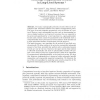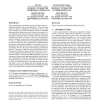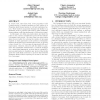546 search results - page 16 / 110 » On the Power of Secure Two-Party Computation |
CONCUR
2008
Springer
15 years 1 months ago
2008
Springer
Abstract. For many cryptographic protocols, security relies on the assumption that adversarial entities have limited computational power. This type of security degrades progressive...
111
click to vote
EDBT
2010
ACM
14 years 9 months ago
2010
ACM
Private matching between datasets owned by distinct parties is a challenging problem with several applications. Private matching allows two parties to identify the records that ar...
124
click to vote
PODC
2012
ACM
13 years 1 months ago
2012
ACM
In recent years, there have been a few proposals to add a small amount of trusted hardware at each replica in a Byzantine fault tolerant system to cut back replication factors. Th...
PODC
2010
ACM
15 years 3 months ago
2010
ACM
Most protocols for distributed, fault-tolerant computation, or multi-party computation (MPC), provide security guarantees in an all-or-nothing fashion: If the number of corrupted p...
CDC
2009
IEEE
15 years 4 months ago
2009
IEEE
— Due to the uncertainty in the forecasting of load patterns, security dispatching finds the generation pattern, which is the most economic and passes all N − 1 contingencies ...



